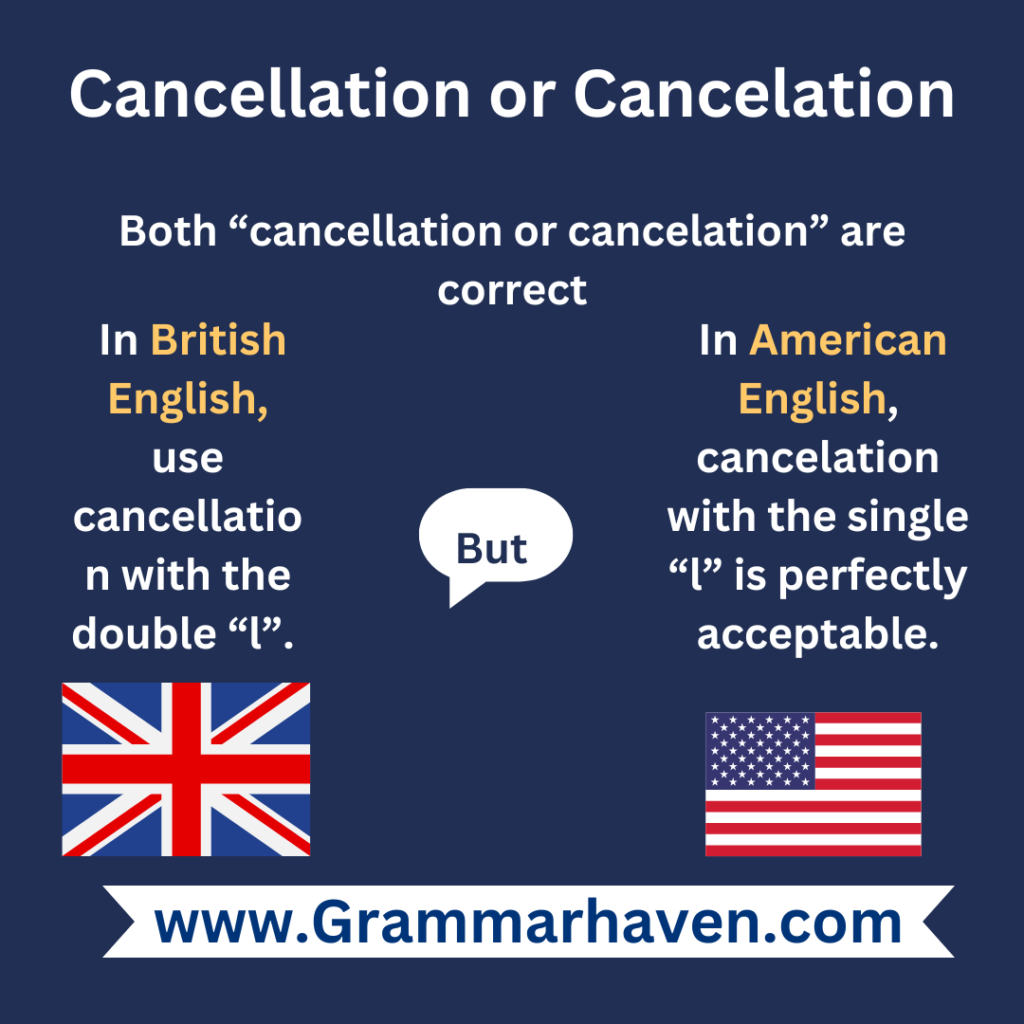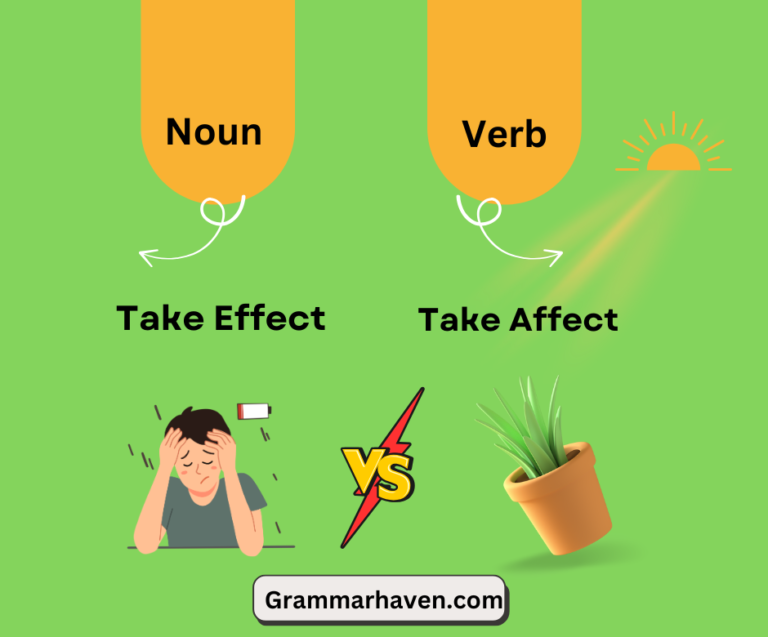Cancellation vs Cancelation: Which Is Right ?
Some words like “cancellation” vs “cancelation.” have variations that leave people unsure which one to use. While both versions exist, many wonder which is correct and why the variation occurs. In this article, we’ll clarify the usage of these two spellings “cancelation vs cancellation.” And discuss their respective uses in British American and English. With this understanding , you’ll be able to enhance your writing precision and avoid potential mistakes.
Why is There Confusion?
In English words are spelled and adapted over time and because of this confusion arises surrounding “cancelation vs cancellation”. This inconsistency is particularly noticeable in different sources, like books, websites, and official documents, where both spellings might appear. Additionally, the presence of both versions in some spell-checking tools or writing platforms adds to the confusion. As a result, many writers are left unsure about which version is the standard or most appropriate to use.

What Does “Cancelation vs Cancellation” Mean?
Noun: Cancelation
Meaning in different contexts :
the action of cancelling something.
“the project was threatened with cancellation”
a crossing out of something written.
“all cancellations on documents must be made indelibly”
a mark made on a postage stamp to show that it has been used.
“covers showing stamps and special cancellations”
Let’s break down the topic to understand the meaning of both terms :
“Cancellation or Cancelation”
- Definition: Both “cancellation or cancelation” refers to the process of stopping or calling off something that was previously planned, such as an event, subscription or flight.
- Same Meaning, Different Spelling: In spite of different spelling , the meaning remains the same .No matter whether you write “cancellation” (commonly used in British English) or “cancelation” (less common, mainly seen in American English), both refer to the act of ending something officially.
- Base Word– “Cancel”: The origin of both terms is the word “cancel,” which means to invalidate or discontinue something from proceeding.
- Usage in different Context: Whatever the version you may choose, both words convey the idea of officially terminating a scheduled plan or agreement.
The difference lies only in spelling preference, not in meaning. Both terms serve the same purpose in writing and conversation.
Cancelled or Canceled? Canceler or Canceller? Cancelling or Canceling?
Just like “cancellation” and “cancelation,” these words follow the same pattern. In British English, you’ll typically see the double “l” in “cancelled,” “cancelling,” and “canceller.” In American English, the single “l” versions—”canceled,” “canceling,” and “canceler”—are more common, though both forms are often accepted in modern usage.
How To Spell “ Cancelation or Cancellation ”?
Now that we’ve traveled and not travelled,( thanks to the same rule) through the spelling rules of British vs. American English, let’s look at the exception. Yes, there’s always an exception.
Both “cancellation or cancelation” are correct,
But
- “cancellation” with two “l’s” is the preferred spelling, especially in British English.
- In American English, the simplified “cancelation” with one “l” exists but is far less common.
To maintain clarity and consistency in your writing, it’s best to use “cancellation” in most cases.
This spelling rule follows the general pattern of American and British English differences, where American English often favors simplified spellings ( single “l”) while British English retains more traditional forms ( single “l”) .
Synonyms of “Cancellation”
| General Synonyms | Business Context | Event/Travel Context | Legal Context |
| Withdrawal | Dissolution | Calling off | Repeal |
| Rescission | Suspension | Delay | Discharge |
| Invalidation | Cease | Dismissal | Nullity |
| Nullification | Discontinuation | Scrapping | Rescission |
Examples of “Cancellation” in Different Context
Here are examples of the word “cancellation” used in different contexts :
1. Travel Context
” Due to severe weather conditions ,the airline announced the cancellation of all flights.”
“He received an email confirming the cancellation of his hotel reservation.”
2. Business/Work Context
“The sudden cancellation of the meeting left everyone confused.”
“Due to budget cuts, the company had to proceed with the cancellation of several projects.”
3. Event Context
- “The concert’s cancellation disappointed thousands of fans.”
- “Rain caused the cancellation of the outdoor wedding ceremony.”
4. Subscription/Service Context
- “I requested the cancellation of my gym membership last week.”
- “Streaming platforms often make the cancellation process easy to retain customers.”
5. Legal Context
- “The contract’s cancellation resulted from the contractor’s failure to meet deadlines.”
- “Late payments caused the cancellation of their lease agreement.”
6. Mathematics/Science Context
- “In algebra, the cancellation of like terms simplifies the equation.”
- “The cancellation of noise is achieved through specialized soundproof materials.”
7. Personal/Social Context
- “The last-minute cancellation of our dinner plans was really frustrating.”
- “She was upset about the cancellation of her date without prior notice.”
8. Technology Context
- “The cancellation of the software update was due to technical glitches.”
- “Many apps allow for easy cancellation of subscriptions directly through settings.”
You can also learn hy meaning in text in different contexts .

Cancelled or Canceled Spelling
The difference between cancelled and canceled comes down to American vs British English.
Canceled or cancelled is the past tense of the verb to cancel. Both spellings are correct; Americans favor canceled (one l), while cancelled (two l’s) is preferred in British English and other dialects.
- American English: canceled (one “l”)
- British English: cancelled (two “l”s)
Examples of Canceled vs cancelled:
American English (canceled) :
- The flight got canceled due to bad weather.
- He canceled his subscription before the next billing cycle.
- The concert I arranged was canceled because the lead singer fell ill.
British English (cancelled) :
- The cricket match was cancelled after heavy rainfall flooded the field.
- His wedding was cancelled due to unforeseen family issues.
- The train service was cancelled because of a staff strike.
Origins of “Cancellation”
- Historical Roots:
- Dates back to the 1530s.
- Derived from the Latin term “cancellationem,” which comes from “cancellare.”
- Original Meaning:
- “Cancellare” means “to make lattice-like” or “to cross out.”
- Initially used to describe marking lines through text to indicate nullification or voiding.
- Evolution of Usage:
- The modern sense of “cancellation”—referring to the act of calling off events—developed later.
- Early Medical Reference:
- In the 15th century, it was used in medical writings to describe the crossing of retinal images.
- 20th-Century Usage:
Became common for referring to canceled reservations, appointments, and similar situations.
You might also like: What is the Past Tense of See and its Past Participle.
Conclusion
In conclusion, both “cancellation vs cancelation” are valid spellings, writing in British English, use cancellation with the double “l”. If you’re following American English conventions, cancelation with the single “l” is perfectly acceptable.
FAQS
Which is correct cancellation or cancelation?
both “cancellation or cancelation” are valid spellings,
writing in British English, use cancellation with the double “l”. If you’re following American English conventions, cancelation with the single “l” is perfectly acceptable.
Is it cancellation or cancelation in the US?
Cancelation and cancellation are both English terms. Cancelation is predominantly used in 🇺🇸 American (US) English ( en-US ) while cancellation is predominantly used in British English (used in UK/AU/NZ) ( en-GB ). In the United States, there is a 91 to 9 preference for “cancellation” over “cancelation”.
How do you spell cancelling in the UK?
The forms of cancel in American English are typically canceled and canceling; in British English they are cancelled and cancelling. Cancellation is the usual spelling everywhere, though cancelation is also sometimes used.
What does cancelation mean?
the act or an instance of canceling. The cancellation of the game was due to bad weather. 2. : something (such as a hotel room or a ticket) made available by the canceling of an arrangement.
Is it spelled canceled or cancelled ?
Cancelled and canceled are two correct spellings of the past tense verb “to cancel.” However, AP style advises to use canceled, with one “l”, because this is common in American English.
Is cancelled grammatically correct?
Canceled or cancelled is the past tense of the verb to cancel. Both spellings are correct; Americans favor canceled (one l), while cancelled (two l’s) is preferred in British English and other dialects. Canceling/cancelling and canceler/canceller follow the same pattern.
How to spell cancelling ?
In American English, the single “l” version ” canceling ” is more common , while British spell it as “cancelling,” preferring double “l” version .
What is past tense of cancel ?
Canceled or cancelled is the past tense of the verb to cancel. Both spellings are correct; Americans favor canceled (one l), while cancelled (two l’s) is preferred in British English and other dialects.
How to spell cancellation correctly ?
“Cancellation” with two “l’s” is the preferred spelling, especially in British English.
In American English, the simplified “cancelation” with one “l” exists but is far less common.







